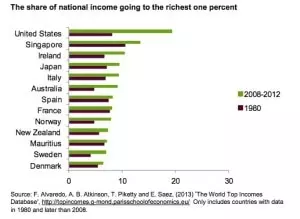Almost half of the world’s wealth is now in the hands of the richest one per cent of the population, a new Oxfam report says. The report, titled Working for the Few, found that only a small number of people control 46% of the world’s money, amounting to $110 trillion.
The report was released Monday, while world leaders gathered in Davos, Switzerland, for the World Economic Forum.
Oxfam also found that the bottom half of the population owns as much wealth as the richest 85 people, and that seven in ten people live in a country where inequality has worsened since 1985. And since the 2008 financial crisis, the report says, the U.S.’s top one per cent has controlled 95% of recovery growth.
A chart from Oxfam’s Working for the Few report shows the share of national income going towards country. Data for the chart comes from F. Alvaredo, A.B. Atkinson, T. Piketty and E. Saez (2013) “The World Top Incomes Database.”
Economic disparity is also a problem in Canada. Using Statistics Canada data, a December 2014 report by the Broadbent Institute found that Canada’s richest 20% own more than two thirds of the country’s wealth.
These stark wealth gaps are putting the world at risk of “opportunity capture,” Oxfam warns. Opportunity capture describes a cycle in which the rich get richer, benefitting from better education, healthcare, tax breaks, and political favour, while the poor get poorer.
Such dramatic gaps also have significant human rights consequences. Education, health, and a high standard of living are all internationally recognized human rights. But while the wealthy control the bulk of the world’s wealth, the poor population is left with fewer resources to access these rights.
The gaps between wealthy and poor often reflect other divides in society. Women, racialized persons, immigrants, persons with disabilities, and other groups are all less likely find themselves in the wealthy one per cent.
To address the world’s dramatic wealth gaps, Oxfam calls for the UN to address inequality in its post-2015 framework, for stronger market regulation, and for the rich to have less influence over politics.
In Canada, poverty and inequality remain complex problems. Nevertheless these significant wealth gaps make it clear that these are problems that we must take action to solve. There are 4.8 million people in Canada who are living in poverty. It’s time for the government to step up in concert with civil society to address this inequality.


